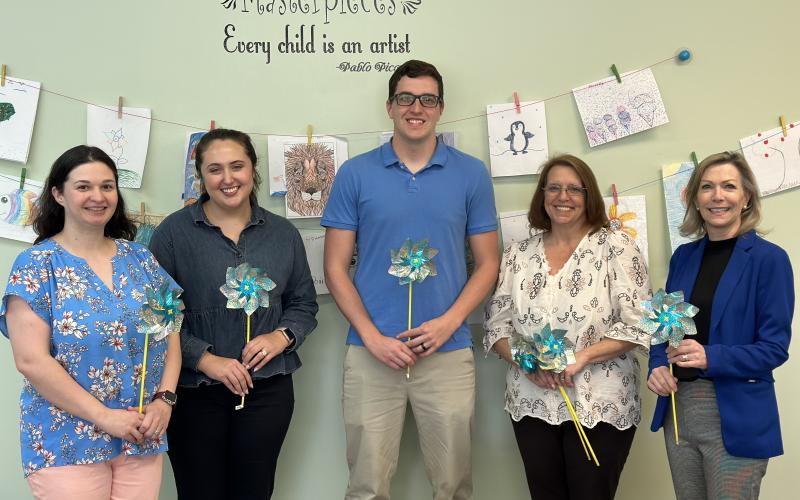Last week, the Georgia General Assembly passed House Bill 993, which would make the grooming of a minor for sex a felony in Georgia punishable with between one to five years of prison time. The bill–sponsored by Representative Alan Powell and now awaiting Governor Brian Kemp’s signature–passed the legislature on the cusp of April, which is National Child Abuse Prevention Month.
For Harmony House, a local nonprofit providing a multitude of services in the Georgia Northern Judicial Circuit to child victims of physical and sexual abuse, and adult victims of sexual assault, HB 993 is “a huge step in the right direction,” providing an avenue through which predatory behavior may be stopped before child molestation and further abuse occurs.
“In some of our cases, it’s very clear that the child has been groomed, and [prosecutors] may not be able to actually prove that abuse happened. But now, if they can prove that grooming happened, it may be something that abusers can be charged with even if they can’t be charged with the abuse,” said Olivia Owensby, Harmony House director of forensic services.
Most of Harmony House’s clients–who can be any age–are within the five-district judicial circuit (Hart, Elbert, Franklin, Madison, and Oglethorpe Counties). CEO Laurie Whitworth explained that there are exceptions, as they also deal with inter-state trafficking and other abuse cases brought to them by the GBI. Harmony House’s comprehensive services include immediate crisis intervention, forensic interviews and medical exams, free therapy for victims and their families, advocacy, court preparation and accompaniment, referrals to community resources, and group support. The organization employs a multidisciplinary approach in its services, working alongside the district attorney’s office, law enforcement, Division of Family and Children Services (DFCS), medical professionals, and other groups to meet client needs. Harmony House also provides interpretation and therapeutic services in Spanish.
As Whitworth explained, Harmony House’s wide array of services and staff is “rare in the world of [Child Advocacy Centers] for a rural area.” The dearth of community programs and resources in the five-county area, such as lack of public transportation, forced the Harmony House team to build from the ground-up about 20 years ago.
Harmony House staff told The Sun they are interested to see the new anti-grooming measures in action upon the governor’s signature–especially given the prevalence of grooming in numerous cases of child sexual abuse they have handled.
“I can count on one hand, in the 18 years I’ve been here, [the times] that the person who has inflicted harm upon a child has been a stranger,” stated Whitworth.
Whitworth furthermore explained that grooming (or simply a form of “manipulation”) not only jeopardizes the victim’s safety in the first place, but also puts the odds of winning their case in court at risk, as children who have been groomed are often not strong witnesses.
A child who has been groomed also may not disclose the abuse easily, explained Owensby. However, this is not only because the child has been manipulated, but also because sometimes their families have been as well.
“The whole point of grooming is to get a child to comply, to get comfortable with abuse. They can even groom parents so they feel comfortable and will let their kids be around the person,” Owensby said. “Especially with little kids, they do feel comfortable…We’re looking for a free narrative…but it can make it difficult for kids to be okay disclosing if they feel comfortable, if they’ve been groomed.”
Whitworth also described the patterns in the innumerable cases of grooming she has seen firsthand, saying that usually the abuser does not only groom one child, but multiple; additionally, the abusers “move in the same circles,” often putting themselves in occupations or volunteer positions where children are involved. Gender is also not a prerequisite, as abusers may target minors who are of the same gender as them.
“We teach stranger danger, but what we so often don’t teach is that [manipulation takes different forms], or even with our own bodies, what is appropriate and what is not,” Whitworth said.
Whitworth stated that she discussed the bill and its importance with Rep. Powell on Feb. 8.
“I sat down with him for a long time and went over the bill in depth...He was awesome. He was so wonderful to spearhead that. There was not a single dissension in that vote…because it was that well done,” said Whitworth. “It is very hard to get something out of committee, to the floor, and then to another floor.”
Harmony House can be contacted at their Royston address by calling (706) 245 8700, or their Elberton office at (762) 533 0113. Their 24/7 hotline number is (706) 680 4723.
Additional information on Harmony House can be found online at https://harmonyhousecacsac.org. Information on how to donate to Harmony House can be found there under the “donations” tab.
Individuals interested in supporting their work in other ways during National Child Abuse Prevention Month may purchase one of their 50/50 raffle tickets for $10, with all proceeds to be used for therapeutic supplies. The winning ticket will be chosen May 1 at 3 p.m. via Facebook Live event. Call the Royston office, or see a staff member to purchase a ticket

